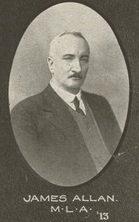James Allan (Australian politician)
| James Allan | |
|---|---|
 |
|
| Member of the Queensland Legislative Assembly for Brisbane South |
|
|
In office 2 October 1909 – 27 April 1912 |
|
| Preceded by | John Huxham |
| Succeeded by | Thomas Bouchard |
| Member of the Queensland Legislative Assembly for Kurilpa |
|
|
In office 27 April 1912 – 22 May 1915 |
|
| Preceded by | New seat |
| Succeeded by | William Hartley |
| Personal details | |
| Born |
James Allan 20 December 1856 Airdrie, North Lanarkshire, Scotland |
| Died | 26 January 1938 (aged 81) Brisbane, Queensland, Australia |
| Nationality | Scottish Australian |
| Political party | Ministerialist |
| Other political affiliations |
Queensland Liberal |
| Spouse(s) | Eliza Balloch Stark (m.1885 d.1942) |
| Alma mater | Andersonian University |
| Occupation | Draper |
James Allan (20 December 1856 – 26 January 1938) was a draper and a member of the Queensland Legislative Assembly.
Allan was born in Airdrie, North Lanarkshire, Scotland, to parents Robert Allan and his wife Mary (née Hodge). Receiving his final education at Andersonian University, Allan started his working life as an apprentice draper to Daley & Co. in Glasgow before arriving in Australia in 1879. Here he worked as an assistant for D. L. Brown & Co. and in 1882, along with Robert Stark formed Allan & Stark, drapers.
The business started out at South Brisbane, but by 1895 business had so greatly increased that they moved to Queen Street, in the centre of Brisbane. In 1911 Allan & Stark was formed into a private company with many of its employees having acquired an interest in it. In 1919 it became a public company and later incorporated the Civil Service Stores and also Stuparts Ltd, who were based in Maryborough. Their former Queen Street premises survives and is heritage-listed as the Allan and Stark Building.
Allan was an alderman in the South Brisbane Municipal Council between 1892 and 1895. Representing the Ministerialists, he won the seat of Brisbane South at the 1909 state election. In 1912, he switched to the new electorate of Kurilpa but lost his seat to Labour's William Hartley in 1915.
...
Wikipedia
